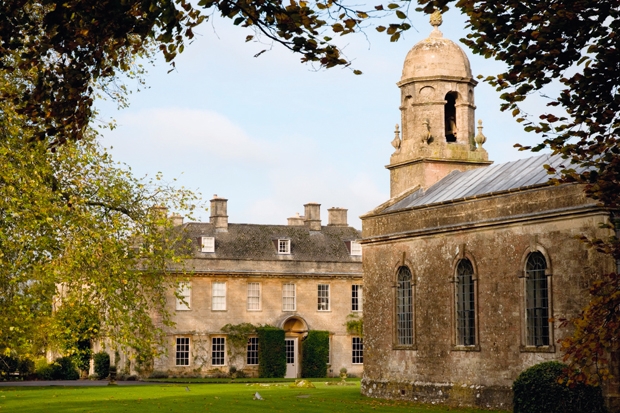It is summer and the listless metropolitan thinks of grass. It cannot afford to stay at Durslade Farmhouse, Somerset, a branch of the Hauser & Wirth art gallery that serves food and plays cow noises in a former barn as authentic country folk rip their eyeballs out. Locals talk about Durslade Farm as a child that died. I think it is a Holocaust memorial for cows, but oblivious.
Babington House is the country branch, and it is open to members, their friends, and hotel guests. There is a a spa called the Cowshed that sells ‘Lazy Cow’ and ‘Moody Cow’ beauty products (misogyny masquerading as irony), a restaurant and a church, which looks uneasy in the grounds, probably because it has to tolerate celebrity weddings. The famous haunt this part of Somerset because it offers a style of rural living that does not frighten them. It is anti-subsistence.
The house is golden, and Queen Anne. It was lovely once, but is now a crèche, surrounded by lawns filled with giant beds (for giant babies) and improbably large umbrellas. There is topiary near the swimming pool and the kitchen garden: miniature hedges for dogs to jump over in some mad dog steeplechase. The paths are covered with woodchip because the members cannot sully their boots by walking on actual mud; that would be too much reality for a class that values only things others do not have, even if they are stupid things such as electric Agas or a path made of woodchip.
Inside I find alarming coloured velvet sofas, strange light-fittings that look like tame space aliens, a rack of boots, presumably to facilitate walking on the woodchips, and a large pile of Vogues, GQs and Tatlers in the ‘library’. These magazines are to idiocy as willows are to water. They show that it is near.
So, a pastiche of country-house living facilitated by insane adherence to the principles of 1990s décor and by the London style of service, which is too servile and makes monsters of us all. Everyone looks like a featured player in a soap opera, or Steve Hilton; everyone, even the children, is wearing hair product and hats. Every-one drives a Range Rover or travels in a London taxi. I see one late at night on the road to Mells. It drives with horrible purpose. Its light is on. That is a cinematic fantasy for Londoners in the country; it is extraordinary. It is either in a horror film or en route to Babington House.
The food is expensive, infantile — why not in a hotel whose honeymoon suite is called ‘the playroom’ (and not, I think, in a sex sense)? — and very good. I eat, with my toddler by the pool, an enormous fish-finger sandwich. It is like a brick made of fish and white bread but, since it cost £9, it has to be large, or rare Japanese fish, which even Nick Jones cannot summon in Somerset. Then we have a cheese brick, which is likewise excellent. Later we progress to the barbecue. Under a tree it serves what Babington House and parents call ‘protein’ and what normal people call ‘fish and meat’ — sausage, burger, salmon, chicken. It is all good but Babington House is essentially self-loathing. For when you do not wish to be in town, but you do not want the country either, where do you wish to be? Nowhere, I would say.







Comments